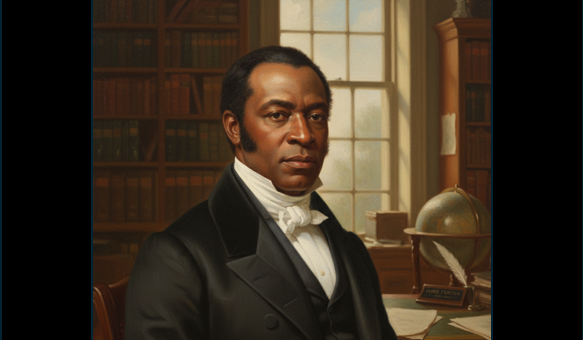James Forten: Wealthy Black Inventor
James Forten (AI image)
James Forten was born a free Black man in Philadelphia in 1766. His parents, Thomas and Sarah Forten, were also born free, but his grandparents were brought to this country as slaves from Africa. In many early writings, their last name appeared as For tune but was later shortened. James Forten’s education ended at the age of ten, after a short time in a school for Black children, run by Quaker abolitionists. He began working at the age of eight in a sail loft with his father.
After his father was killed in a boating accident in 1775, he went to work in a grocery store to support his moth er. When he was 14 years old Forten signed up to serve on the Royal Lewis, as a powder boy during the Revolutionary War. His job was to bring gun powder to the ship’s cannons. His life changed when he returned from the war. He served as an apprentice in sail making to man named Robert Bridges. He was later made foreman. When Bridges retired, Forten purchased the sail making business. He became very successful employing 38 men, with half of them being white.
James Forten invented a sail to make the guiding of ships easier. His business became so popular that he became one of the most prosperous men in Philadelphia. He built a luxurious three-story house for his wife. His life as a wealthy businessman did not stop with just making money for his family. Over a period of ten years, he turned his business into the largest sail producer in Philadelphia. Forten also became one of the most well known abolitionists of his time. He used his fortune of over $300,000 to purchase the freedom of many slaves.
He founded numerous organizations to help recently freed slaves. At one point he bought the freedom of an entire family. Forten financed many activities designed to support the abolitionist movement in Philadelphia. He spoke out at every opportunity against the enslavement of Blacks and used his voice to encourage others to get into the fight for freedom. On the evening of April 14, 1836, Forten spoke before the Ladies Anti-Slavery Society of Philadelphia. The following is an excerpt from his address: “Ladies, in a word, it is my indispensable duty, in view of the helpless, the friend less condition of my countrymen in chains, to raise my voice to plead for the restoration of their inalienable rights. It is the duty of every individual to become advocates of the oppressed.”
James Forten was much more than an abolitionist. He was close to Black leaders in Philadelphia such as Rich ard Allen and Absalom Jones. With the help of 2500 Blacks they guarded Philadelphia against the British during the war of 1812. He also supported William Lloyd Garrison’s abolitionist newspaper, “The Liberator,” with his money. Forten’s home was a station on the Underground Railroad for fugitive slaves. His life is well-documented in a book titled James Forten: A Gentleman of Color written by Julie Winch. A handsome watercolor painting of Forten appears inside the cover. Winch stated that much of the research for the book was not only taken from libraries and archives, but also from a variety of sailing vessels across the United States, Canada, and Great Britain.
His life story can also be found in articles published by the Liberator and the Pennsylvania Freeman. Winch also noted that although Forten was respected by many whites, he was cautioned by some to remind Blacks that they should not seek equality with Whites. A great book for our youth to read about Forten’s involvement in the Revolutionary War is called The Pris on-Ship Adventures of James Forten, Revolutionary War Captive written by Martin Rhodes Figley.
It highlights his imprisonment after being captured by the British during the war. What he feared most during this time was being sold back into slavery. He was released after seven months. Forten was at times contro versial because of his strong stand against the enslavement of his people. However, at the time of his death on March 4, 1842, thousands of people, both Black and White attended his funeral. Even during the 1800s, James Forten was a great example of the American spirit of hard work and a determination to succeed.


